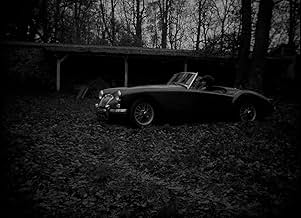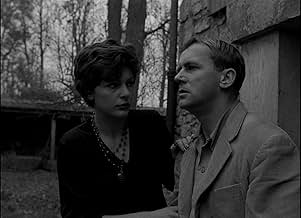IMDb-BEWERTUNG
6,7/10
2857
IHRE BEWERTUNG
Füge eine Handlung in deiner Sprache hinzuThe indiscreet Terry, mistress of an American journalist, revealed to her lovers, Juan and Gérard, something they should never have known.The indiscreet Terry, mistress of an American journalist, revealed to her lovers, Juan and Gérard, something they should never have known.The indiscreet Terry, mistress of an American journalist, revealed to her lovers, Juan and Gérard, something they should never have known.
- Regie
- Drehbuch
- Hauptbesetzung
- Auszeichnungen
- 1 Gewinn & 1 Nominierung insgesamt
Louison Roblin
- Ida
- (as Louise Roblin)
Empfohlene Bewertungen
Anne Goupil (Betty Schneider) is a literature student in Paris in 1957. Her elder brother, Pierre, takes her to a friend's party where the guests include Philip Kaufman, an expatriate American escaping McCarthyism, and Gerard Lenz, a theater director who arrives with the mysterious woman Terry.
Begun in 1957 and completed three years later, it was then-critic Jacques Rivette's first full-length film as a director and one of the first works of the French New Wave, though it was not released theatrically until 1961. Oddly, it seems to be one of the lesser-known today, despite being a fascinatingly odd mystery.
Apparently many people say this film is "like a David Lynch movie". That similarity is there, so I appreciate that... but then the question becomes, does that mean that David Lynch films are "like a Jacques Rivette movie" since Rivette came first by quite a few years?
Begun in 1957 and completed three years later, it was then-critic Jacques Rivette's first full-length film as a director and one of the first works of the French New Wave, though it was not released theatrically until 1961. Oddly, it seems to be one of the lesser-known today, despite being a fascinatingly odd mystery.
Apparently many people say this film is "like a David Lynch movie". That similarity is there, so I appreciate that... but then the question becomes, does that mean that David Lynch films are "like a Jacques Rivette movie" since Rivette came first by quite a few years?
A rather wordy first feature from Jacques Rivette set in 1957 and probably filmed that year as we know it took some time to get a release. If the film had difficulties back in the day it would seem it has even more now. The young men look far too old to be going around acting in the way they do yet we are presented with this bunch of alienated persons, alienated either by their own existentialist attitude and stated beliefs or their immigrant status. One has fled Spain another the fruits of Mccarthyism in the US and all meet and disperse, foretelling of doom, murder and suicide. At the same time a production of Shakespeare's Pericles is being attempted and although I do not know the play I understand the problems of staging it is an ongoing feature and the unresolved nature of much of the play is reflected here in the story of alienated 'youth'.
This is an unusual film. It revolves around a group of characters that are slightly connected to each other through their artistic tendencies and/or political beliefs. The group is presented well - it is quite realistic, even though it is so colourful. This is perhaps because the criteria for being part of the group are so 'normal'. Friends, people with similar interests.. acquaintance networks - this is something that is presented very well in the film.
A sinister undercurent pervades the whole movie: a background plot that is never revealed, or shown directly - it is something that the characters speak to each other about and make reference to. While in other movies the conspiracy plot would have been the central theme, here it is pushed into the background, delegated to a simple object of discussion - the movie instead revolves around the lives of the characters and in particular, the protagonist's, from whose point of view the situation is seen. By bringing the focus onto the characters and their daily lives, illusions and aspirations, the movie manages to to breathe fresh life into what would have otherwise been just another conspiracy film.
A few technical things: The acting is not very consistent. The parisian scenes were very good and the photography was aesthetically pleasing. The music enhanced the atmosphere significantly, though some of its psychedelic overtowns were a bit overpowering at points (making the dialogue hard to follow - if the intention was to transfer the confusion/paranoia to the viewer, it was appropriate, however).
It's not a masterpiece, but it is definitely interesting and worth watching at least once.
A sinister undercurent pervades the whole movie: a background plot that is never revealed, or shown directly - it is something that the characters speak to each other about and make reference to. While in other movies the conspiracy plot would have been the central theme, here it is pushed into the background, delegated to a simple object of discussion - the movie instead revolves around the lives of the characters and in particular, the protagonist's, from whose point of view the situation is seen. By bringing the focus onto the characters and their daily lives, illusions and aspirations, the movie manages to to breathe fresh life into what would have otherwise been just another conspiracy film.
A few technical things: The acting is not very consistent. The parisian scenes were very good and the photography was aesthetically pleasing. The music enhanced the atmosphere significantly, though some of its psychedelic overtowns were a bit overpowering at points (making the dialogue hard to follow - if the intention was to transfer the confusion/paranoia to the viewer, it was appropriate, however).
It's not a masterpiece, but it is definitely interesting and worth watching at least once.
Rivette is perhaps the least known of the 5 Cahiers directors of the New Wave. I've only seen The Nun before and I enjoyed it. This first feature was disappointing to me. Great location work and photography but way too long. Basically a pretty, naive girl gets involved with a bunch of pretentious a-holes who suggest a suicide was a murder and she tries to play amateur detective. Not in the sense an American film like this would. It's mostly her confronting different people who tell her enough to keep her interested but no evidence is found. The film mentions creeping fascism in the forms of McCarthyism in the US and the Franco regime in Spain. But is it all just paranoia? By the end, I could care less and it turned out to be much ado over nothing (Shakespeare). I don't get what this film was trying to achieve. I assume Rivete was a leftist so is he criticizing them or supporting them? Might have been better with the running time cut and a new ending. This isn't The 400 Blows or breathless or even Le Beau Surge.
It's like the New Wave version of a mystery/conspiracy thriller, and in that regard it works really well. The black and white cinematography suits the tone perfectly, even if the very poor quality of the film makes it hard to tell, and it's supported by some disorienting editing and a great use of light and shadows. There's also a really terrific score, probably one of the best for this genre. Even though the film runs 140 minutes, it never really feels boring, as the conversations between characters are gripping enough to keep the viewer's interest. The story is rather strange, as it appears to be non-linear and occasionally irrelevant, but it seems to work out at the end. However, unfortunately, the end is a complete disappointment, as it attempts to hammer home some political viewpoints that just end up being confusing, and then coasts to a unsatisfactory finish without really tying up any of the loose ends. It's an interesting watch, and you could do a lot worse, but it's no masterpiece.
Wusstest du schon
- WissenswertesAs an inside joke, in Sie küßten und sie schlugen ihn (1959) the film Antoine Doinel and his parents go to see is "Paris Belongs to Us", which wouldn't be released for another two years.
- PatzerNear the end, when Pierre is on a public phone at Dupleix, a poster near him reads "DIMANCHE 31 MAI" (Sunday 31 May), advertising a meeting of the Parti Socialiste Unifié. May 31st was a Sunday in 1959, and this scene was filmed in late 1958. However, the film is supposed to be taking place in June 1957, so it makes no sense that a meeting is being advertised nearly 2 years in advance.
- Zitate
Bernard: You're the guilty ones, with bloodstained hands.
Philip Kaufman: You go too far.
Bernard: Too far? Too far?
Philip Kaufman: What about Mayakovsky? He wasn't Spanish, but he killed himself.
Bernard: Mayaskovsky who?
Blonde à la party: Mayakovsky, wowsky!
[laughs]
- Crazy Credits"Paris belongs to nobody." PEGUY
- VerbindungenFeatured in Cinéma, de notre temps: Jacques Rivette le veilleur: 1-Le jour (1990)
Top-Auswahl
Melde dich zum Bewerten an und greife auf die Watchlist für personalisierte Empfehlungen zu.
- How long is Paris Belongs to Us?Powered by Alexa
Details
- Erscheinungsdatum
- Herkunftsland
- Sprachen
- Auch bekannt als
- Paris Belongs to Us
- Drehorte
- Pont des Arts, Paris 6, Paris, Frankreich(2 scenes on bridge)
- Produktionsfirmen
- Weitere beteiligte Unternehmen bei IMDbPro anzeigen
- Laufzeit
- 2 Std. 21 Min.(141 min)
- Farbe
- Sound-Mix
Zu dieser Seite beitragen
Bearbeitung vorschlagen oder fehlenden Inhalt hinzufügen


































